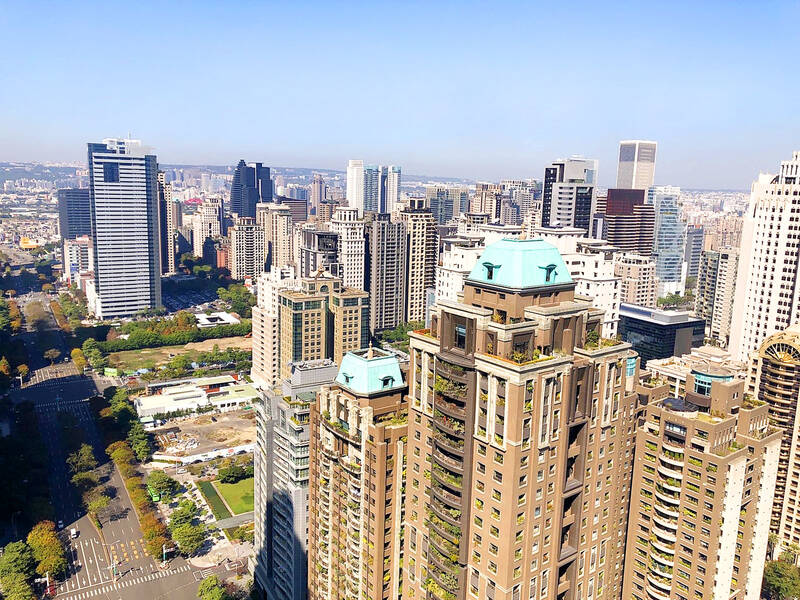New housing projects in the first 10 months of this year totaled more than NT$980 billion (US$31.44 billion) in northern Taiwan, with presale projects accounting for 85.5 percent, unfazed by legislative efforts to ban their resale, My Housing Monthly (住展雜誌) reported.
Increasing building material prices and labor shortages have prompted developers to slow construction on housing projects and delay their entry to the market, which would further widen the gap, the Chinese-language magazine said.
“Presale projects continue to dominate the new housing market one year after the introduction of bills to ban resale of presale contracts,” magazine research manager Chen Tsai-chi (成采錡) said.

Photo: Hsu Yi-ping, Taipei Times
The bills are intended to cool the property market, as housing prices have soared throughout Taiwan in the past two years on the back of an economic boom and firms shifting manufacturing facilities home from China amid US-China trade tensions, Chen said.
However, the legislature has not made any progress on the bills and might not pursue the efforts in the coming months as an economic slowdown and monetary tightening dampen buying interest, Chen said.
As of last month, presale projects in northern Taiwan totaled NT$844.5 billion, leaving newly completed houses a small share of 14.5 percent, or NT$143 billion, the magazine said.
The Hsinchu area has the lowest ratio of newly completed houses, at 3 percent, or NT$4.17 billion versus presale projects at NT$140 billion, as strong demand amid limited supply left buyers no choice but to target presale projects, it said.
Developers have aggressively launched presale projects in Hsinchu to meet fast-growing demand from cash-flush technology engineers, it added.
Newly completed houses account for 10.8 percent of the market in Taoyuan, which has a total volume of NT$285.1 billion, it said.
In Taipei, presale projects totaled NT$205.3 billion in the first 10 months, while newly completed houses rose 6.2 percentage points to NT$44.24 billion, or a 21.5 percent market share, due to the release of a luxury residential complex in Zhongzheng District (中正), it said.
Newly completed houses totaled NT$57.4 billion, or 17.9 percent of the NT$320 billion new housing market in New Taipei City, it said, adding that the ratio fell 3.4 percentage points from a year earlier.
Newly completed houses shed 11 percentage points to 16.8 percent in Yilan County, while dropping 9.1 percentage points to 18.1 percent in Keelung, it said.
The difference between presale projects and newly completed houses is expected to grow, as developers and builders postpone construction to cope with rising costs, a practice that would shrink the pool of newly completed houses, Chen said.

The US dollar was trading at NT$29.7 at 10am today on the Taipei Foreign Exchange, as the New Taiwan dollar gained NT$1.364 from the previous close last week. The NT dollar continued to rise today, after surging 3.07 percent on Friday. After opening at NT$30.91, the NT dollar gained more than NT$1 in just 15 minutes, briefly passing the NT$30 mark. Before the US Department of the Treasury's semi-annual currency report came out, expectations that the NT dollar would keep rising were already building. The NT dollar on Friday closed at NT$31.064, up by NT$0.953 — a 3.07 percent single-day gain. Today,

‘SHORT TERM’: The local currency would likely remain strong in the near term, driven by anticipated US trade pressure, capital inflows and expectations of a US Fed rate cut The US dollar is expected to fall below NT$30 in the near term, as traders anticipate increased pressure from Washington for Taiwan to allow the New Taiwan dollar to appreciate, Cathay United Bank (國泰世華銀行) chief economist Lin Chi-chao (林啟超) said. Following a sharp drop in the greenback against the NT dollar on Friday, Lin told the Central News Agency that the local currency is likely to remain strong in the short term, driven in part by market psychology surrounding anticipated US policy pressure. On Friday, the US dollar fell NT$0.953, or 3.07 percent, closing at NT$31.064 — its lowest level since Jan.

The New Taiwan dollar and Taiwanese stocks surged on signs that trade tensions between the world’s top two economies might start easing and as US tech earnings boosted the outlook of the nation’s semiconductor exports. The NT dollar strengthened as much as 3.8 percent versus the US dollar to 30.815, the biggest intraday gain since January 2011, closing at NT$31.064. The benchmark TAIEX jumped 2.73 percent to outperform the region’s equity gauges. Outlook for global trade improved after China said it is assessing possible trade talks with the US, providing a boost for the nation’s currency and shares. As the NT dollar

PRESSURE EXPECTED: The appreciation of the NT dollar reflected expectations that Washington would press Taiwan to boost its currency against the US dollar, dealers said Taiwan’s export-oriented semiconductor and auto part manufacturers are expecting their margins to be affected by large foreign exchange losses as the New Taiwan dollar continued to appreciate sharply against the US dollar yesterday. Among major semiconductor manufacturers, ASE Technology Holding Co (日月光), the world’s largest integrated circuit (IC) packaging and testing services provider, said that whenever the NT dollar rises NT$1 against the greenback, its gross margin is cut by about 1.5 percent. The NT dollar traded as strong as NT$29.59 per US dollar before trimming gains to close NT$0.919, or 2.96 percent, higher at NT$30.145 yesterday in Taipei trading